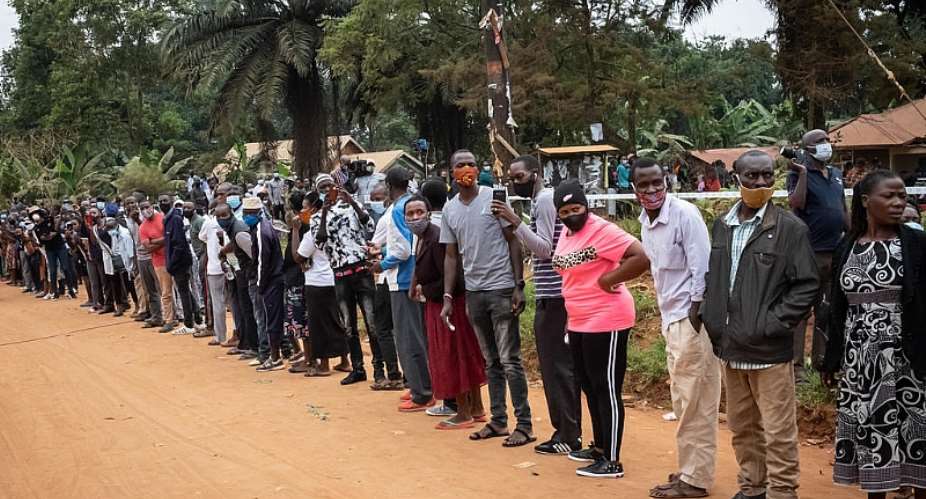Ugandans went to the polls on Thursday for elections that see 76-year-old incumbent President Yoweri Museveni up against 38-year-old pop star turned politician, Bobi Wine.
Large numbers turned out to vote as some polling stations in Kampala experienced problems with biometric identification machines and arrival of polling materials, according to local media.
Several stations opened late, which stalled the voting process, the electoral commission said.
Presence of security forces was felt throughout the capital Kampala and personnel were deployed to the tops of tall buildings. Foreign journalists reported military and police across Uganda patrolling on foot.
Internet shutdown
Museveni's government halted access to parts of the internet, enforcing an internet blackout on the eve of the polls. The restrictions cut off social media and messaging with services from Twitter, Facebook, WhatsApp, Instagram, Snapchat, Skype, Viber and some Google and Telegram services impacted, according to NetBlocks, an organisation tracking internet disruptions.
The shutdown caused anxiety among some voters who could not access social media services or news websites.
The campaign period was characterised by tight restrictions against the campaign of opposition challenger Bobi Wine, whose real name is Robert Kyagulanyi, with security forces cracking down on his supporters, as well as limits and attacks on journalists.
With the vote held amidst the coronavirus pandemic, long queues at polling stations caused some difficulties with social distancing, according to reports, although many Ugandans were seen wearing masks as they cast their ballot.
The country has 38,085 confirmed cases of Covid-19, according to Africa CDC statistics.
Economic uncertainty
Violence during the campaign period and uncertainty surrounding the elections weighed on the Ugandan shilling, said AZA, an African currency broker.
“The Central Bank of Uganda on Monday said it had converted some treasury bonds worth over 1 trillion Shillings maturing on Jan. 21 into securities that will come due between 2023 and 2040,” said Terry Karanja, a treasury associate at AZA.
“While no reason was officially cited, the action signals the country may be struggling to raise enough revenue from taxes and exports to meet obligations amid pressure from the Covid-19 pandemic and concern over an election marred by violence and security crackdowns.”
Diplomatic snub
The US embassy in Uganda said it had “profound disappointment” over the government's denial of more than 75 percent of their requests for election observer accreditation, saying it would be impossible to “meaningfully” observe polling.
EU foreign policy chief Josep Borrell warned this week that the atmosphere in Uganda ahead of elections had been “marred by violence and numerous difficulties faced by several opposition presidential candidates, civil society organisations, human rights defenders, electoral experts as well as journalists,” a statement said.
“The excessive use of force by law enforcement and security agencies has seriously tarnished this electoral process,” Borrell added.
Bobi Wine was recently dragged out of a vehicle by security forces during a press conference with international media, he has also been arrested several times, speaking of the pressure exerted by Museveni's authoritarian regime and a state apparatus he has controlled since 1986.





 'Kill whoever will rig Ejisu by-election' – Independent Candidate supporters inv...
'Kill whoever will rig Ejisu by-election' – Independent Candidate supporters inv...
 Ashanti Region: ‘Apologize to me for claiming I owe electricity bills else... – ...
Ashanti Region: ‘Apologize to me for claiming I owe electricity bills else... – ...
 Ghana is a mess; citizens will stand for their party even if they’re dying — Kof...
Ghana is a mess; citizens will stand for their party even if they’re dying — Kof...
 Internet shutdown an abuse of human rights — CSOs to gov't
Internet shutdown an abuse of human rights — CSOs to gov't
 Free SHS policy: Eating Tom Brown in the morning, afternoon, evening will be a t...
Free SHS policy: Eating Tom Brown in the morning, afternoon, evening will be a t...
 Dumsor: A British energy expert 'lied' Ghanaians, causing us to abandon energy p...
Dumsor: A British energy expert 'lied' Ghanaians, causing us to abandon energy p...
 What a speech! — Imani Africa boss reacts to Prof. Opoku Agyemang’s presentation
What a speech! — Imani Africa boss reacts to Prof. Opoku Agyemang’s presentation
 Dumsor: Tell us the truth — Atik Mohammed to ECG
Dumsor: Tell us the truth — Atik Mohammed to ECG
 Dumsor: Don't rush to demand timetable; the problem may be temporary — Atik Moha...
Dumsor: Don't rush to demand timetable; the problem may be temporary — Atik Moha...
 Space X Starlink’s satellite broadband approved in Ghana — NCA
Space X Starlink’s satellite broadband approved in Ghana — NCA
